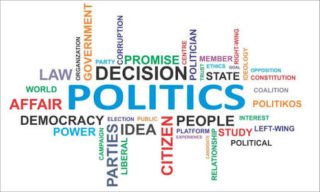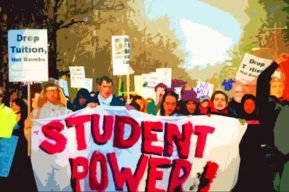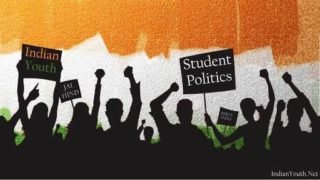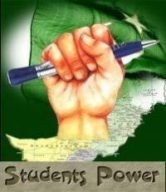•What is politics?
Learned scholars may set forth learned definitions and discuss their correctness.
For the ordinary man, politics is that thing which aims at controlling his life by organizing the governmental machinery. Politics makes for the defense of the country. It is responsible for civil order. It controls trade and commerce. Politics has to look after education and sanitation, in fact everything that touches a man’s life.

If that is so, then why shuold the students be debarred from taking interest in what is the most vital thing in their lives? Not that a student should be a full-fledged politician. But just as he trains himself to be a doctor or a lawyer, so also he should train himself to take an intelligent interest in the politics. Which in turn will help him resolveproblems, he will be called upon, to solve in later life.

•General Misconception
The argument that is generally put forward against students’ taking any interest in politics is that they are immature. And thus it is likely that they will be easily misguided by cleaver agents of political parties. But if they keep aloof from politics altogether, they will remain political babies even when they are grown up. As a result they will be more easily misled in later life on account of their ignorance and inexperience.
At schools and colleges, students read history, elements of public administration, civics and political philosophy and political economy. If they can understand these things in abstract, why should they be kept away from the concrete realities of political life?

It is true that students may discover late in life that the interest they took in politics, in the early years, was on the wrong lines and they might change their opinion. But so do most politicians even in their maturity. Experience makes men learn new things and unlearn the old.
•Precaution
There is only one precaution to be taken in the matter of student politics. It must not be forgotten that, the principal duty of a student as a student is to mind his lessons and not take part in public politics. He is to acquire education, to train up his mind and to prepare himself for the duties of life. If he takes too prominent a part in politics, he cannot but be deflected from his main occupation. A medical student trains himself to be a doctor but he doesn’t practice as a doctor until he has graduated from a medical school or college.

There is a line of demarcation between taking an intelligent interest in politics and taking part in public politics. And this line should NEVER be crossed.

We must remember that the students of today are the citizens of tomorrow. He must train himself not to be a mere tool of an alien bureaucracy but to be a man who will exercise the rights and bear the responsibilities of a free citizen. He will have to fight for his country in war and to govern it along progressive lines in peace.

That is why he must take an intelligent interest in politics as in other affairs. But if he loses himself in these affairs before he has finished his studies, he will be an ignorant, uneducated and a bad politician. Thereby, his activities will defeat their purpose.



